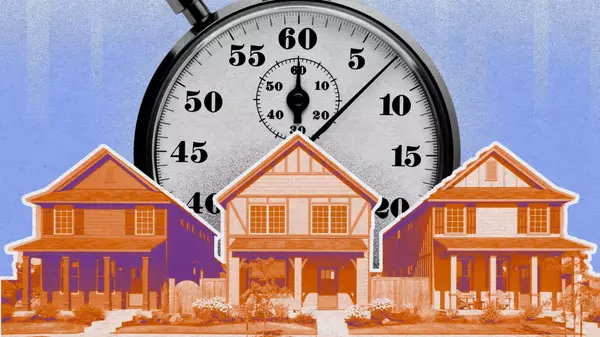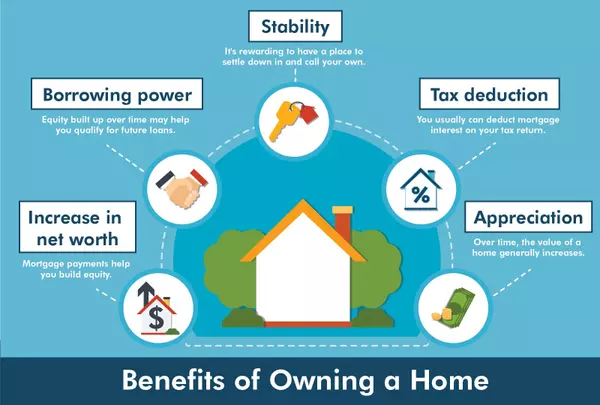
Secrets To Selling Your House Quickly
Secrets To Selling Your House Quickly Seeing your house sit on the market without any bites is the ultimate frustration. And unfortunately, some sellers are in that tricky spot today. According to data from the National Association of Realtors (NAR), the average time a house spends on the market has increased over the past few years (see graph below): A recent post from Realtor.com notes a similar trend: “During the week ending Sept. 14, homes stayed on the market eight days longer compared to last year. With more choices available and mortgage rates expected to fall, buyers are taking their time, which means sellers will need to be patient and flexible.” Some of that is because inventory has gone up, so buyers have more options. And higher mortgage rates have definitely slowed demand over the past two years, and that’s out of your control. But here’s the secret. There’s something you can control – it's also where those other sellers missed the mark. They didn’t work with the right agent. Make no mistake, with the right strategy and agent partner, your house can still sell quickly, even today. If time matters to you, you need to partner with an agent who understands this shifting market. That agent will be your go-to resource on what buyers are looking for right now, and how to position your home to hit the mark. Here are just a few tips a great real estate agent will walk you through. They may seem simple, but advice like this can make all the difference. 1. Competitive Pricing: One of the most critical factors in selling your home quickly is setting the right price. A local real estate agent will do a competitive market analysis by reviewing recent sales and current listings for your area. Then, they’ll use that data to make sure your home is priced accurately for today’s market. This strategic pricing approach is the best way to make sure you’re hitting the sweet spot on price. If you don’t lean on an agent for this, it can really slow your process down. As U.S. News says: “. . . setting an unrealistically high price with the idea that you can come down later doesn’t work in real estate . . . A home that’s overpriced in the beginning tends to stay on the market longer, even after the price is cut, because buyers think there must be something wrong with it.” 2. The Home’s Condition: Homes that are well maintained, have great curb appeal, and are updated with modern finishes tend to sell faster. So, if speed is a priority, make sure your house makes a great first impression. An agent is a key resource on what buyers will be looking for, if staging is worthwhile, and what repairs you need to tackle before you list. Ramsey Solutions offers this advice: “In the spirit of selling your home fast, take care of things now that will be a problem in the closing process. Talk to your agent about fixes you’ll need to make to pass the home inspection, like: plumbing problems, roof damage, electrical issues, HVAC glitches. . . These are issues you’ll be expected to take care of before any buyers close on your house—you might as well get ahead of the game to help your home sell faster.” 3. Incentives and Extras: If you want to stand out from those other homes on the market, offering incentives or concessions, like help with closing costs, a home warranty, or including additional items (like appliances or furniture) with the sale can sweeten the deal for buyers. A real estate agent can suggest the right incentives to offer based on current market conditions and buyer expectations, so you can close the sale even faster. Bottom Line Selling a home quickly in a shifting market requires a strategic approach and an in-depth understanding of what buyers want. That’s why partnering with a local real estate agent is so important. As Forbes says: “When time is of the essence, you can’t afford to take a chance on an inexperienced housing professional. Instead, you’ll want to work with a real estate agent who knows your market and has helped sellers in your situation before.” Let’s connect to make sure you’re set up for success.

Should I Use a Local Realtor?
Whether it's better to go with a local realtor or not depends on various factors and your specific needs. Here are some considerations to help you decide: Local Knowledge: Local realtors often have a deep understanding of the local real estate market, including neighborhood trends, property values, and the local community. This knowledge can be valuable when buying or selling a property. Network and Contacts: Local realtors typically have established networks and connections with other professionals in the area, such as inspectors, appraisers, and contractors. This can streamline the process and help you find trusted service providers. Accessibility: A local realtor is usually more accessible for in-person meetings and property visits. They can quickly respond to your needs and show you properties that meet your criteria. Personalized Service: Local realtors may offer more personalized service because they often work with fewer clients compared to large national agencies. They can tailor their approach to your specific needs. Negotiation Skills: Local realtors may have a better understanding of local negotiation dynamics and market conditions, allowing them to help you get the best deal. Legal and Regulatory Expertise: They are usually well-versed in local real estate laws and regulations, which is important for a smooth transaction. However, there are situations where it may make sense to consider other options: Specialized Needs: If you have unique real estate requirements that are best served by an out-of-town or specialized realtor, it may be worth considering a non-local agent. National or International Property: If you are buying or selling property in multiple locations or across state or national borders, a local realtor might not be the best choice. Online Resources: If you are confident in your ability to research properties and the local market, you might be comfortable working with an online real estate platform or a non-local agent. Personal Preferences: Ultimately, the decision may come down to your personal preferences. Some people prioritize the convenience of working with a local realtor, while others may prefer a particular agent or agency with a strong reputation, even if they are not local. It's essential to interview and evaluate multiple realtors, whether local or not, to find the one who best meets your needs and priorities. Ask about their experience, track record, and how they plan to assist you in your real estate transaction.

Should I Join a Real Estate Team
Joining a real estate team can offer several benefits, depending on your goals and circumstances. Here are some reasons why you might consider joining a real estate team: Mentorship and Training: Real estate teams often provide mentorship and training programs for new or less experienced agents. You can learn from more experienced agents and gain valuable insights into the industry. Support and Resources: Being part of a team means you have access to a network of colleagues who can offer support, guidance, and resources. This can be especially helpful when facing challenges or complex transactions. Lead Generation: Many real estate teams have established lead generation systems in place. This can help you get more leads and clients, which is essential for building your business. Marketing and Branding: Teams often have marketing and branding strategies in place, which can help you market yourself and your listings more effectively. Administrative Assistance: Teams may provide administrative support, such as transaction coordinators or marketing specialists, freeing you up to focus on sales and client relationships. Cost Sharing: Some expenses in real estate, such as marketing or office space, can be shared among team members, potentially reducing your overhead. Accountability: Being part of a team can provide a sense of accountability, as you'll have colleagues and leaders to help you set and achieve your goals. Learning Opportunities: Real estate teams often hold regular meetings and training sessions, providing ongoing opportunities for professional development. Diverse Skill Sets: Teams may consist of agents with various specializations and strengths, allowing you to collaborate and learn from a diverse group of professionals. Work-Life Balance: By sharing responsibilities with team members, you may be able to achieve a better work-life balance, as tasks can be distributed more effectively. Credibility: Joining a reputable real estate team can enhance your credibility as a real estate agent, as clients often associate teams with professionalism and success. Faster Growth: Working with a team can accelerate your career growth, as you can benefit from the team's established systems and reputation. It's important to carefully consider your individual goals, preferences, and the specific team you're considering before making a decision. Not all real estate teams are the same, and the experience can vary widely depending on the team's structure, culture, and leadership. Before joining a team, it's a good idea to interview team leaders and members to ensure it's a good fit for your career aspirati
Categories
Recent Posts











